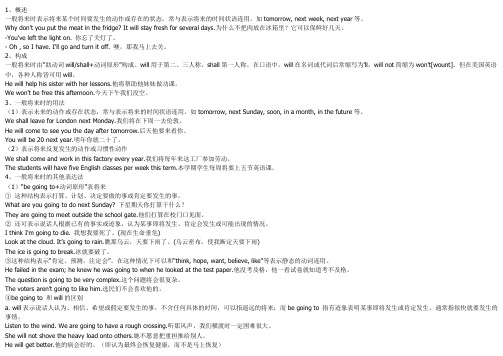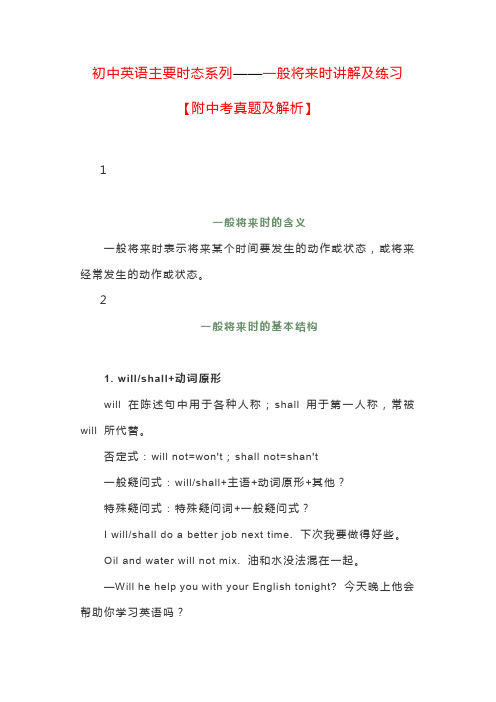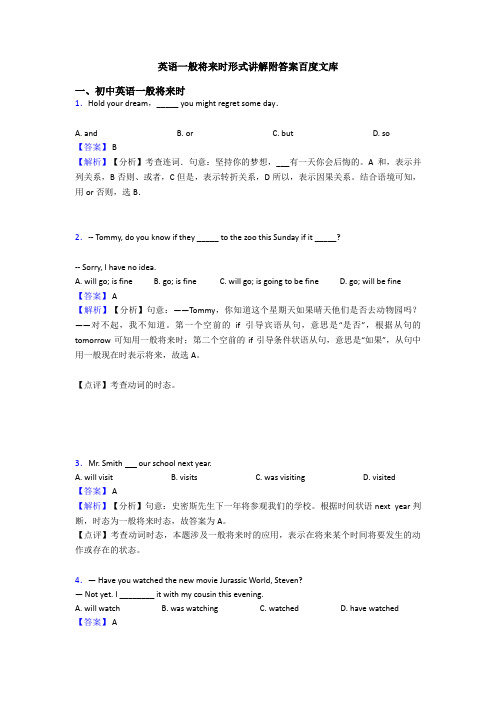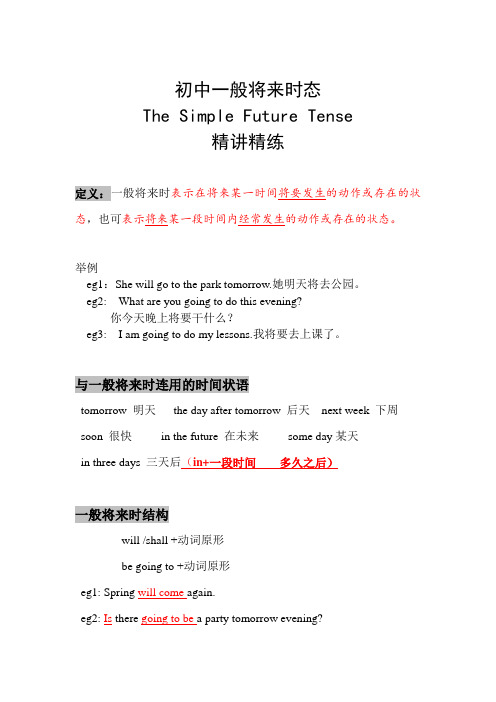初中一般将来时讲解及练习
(完整版)一般将来时态讲解及练习和答案

1、概述一般将来时表示将来某个时间要发生的动作或存在的状态,常与表示将来的时间状语连用,如tomorrow, next week, next year等。
Why don’t you put the meat in the fridge? It will stay fresh for several days.为什么不把肉放在冰箱里?它可以保鲜好几天。
-You've left the light on. 你忘了关灯了。
- Oh , so I have. I'll go and turn it off. 噢,那我马上去关。
2、构成一般将来时由“助动词will/shall+动词原形”构成。
will用于第二、三人称,shall第一人称。
在口语中,will在名词或代词后常缩写为'll,will not简缩为won’t[wount]。
但在美国英语中,各种人称皆可用will。
He will help his sister with her lessons.他将帮助他妹妹做功课。
We won't be free this afternoon.今天下午我们没空。
3、一般将来时的用法(1)表示未来的动作或存在状态,常与表示将来的时间状语连用,如tomorrow, next Sunday, soon, in a month, in the future等。
We shall leave for London next Monday.我们将在下周一去伦敦。
He will come to see you the day after tomorrow.后天他要来看你。
You will be 20 next year.明年你就二十了。
(2)表示将来反复发生的动作或习惯性动作We shall come and work in this factory every year.我们将每年来这工厂参加劳动。
【语法专练】初中英语一般将来时讲解与练习(含答案)50题

初中英语:一般将来时专项练习题1.If you see the cartoon films, you will __________ laugh.A.be made B.makeC.make to D.be made to【答案】D【解析】【详解】句意:如果你看卡通电影,你会被逗乐的。
短语make sb. do sth.表示使某人做某事;被动语态是sb. be made to do sth.表示被使得去做某事。
根据题意,故选D。
2.The 31th Olympic Games _______ in Rio de Janeiro of Brazil in 2016. A.is held B.will holdC.will be held D.is going to hold【答案】C【解析】【详解】试题分析:句意:第31届奥运会将于2016年在巴西里约热内卢举行。
举办奥运会,The 31th Olympic Games在句中作主语,用被动语态。
2016年将要发生的动作,用一般将来时态。
故选C。
【考点定位】:考查动词时态及语态辨析。
3.--Have you washed the clothes?--Not yet. But they__________in half an hour.A.wash B.will wash C.will be washed 【答案】C【解析】【详解】句意:——你洗衣服了吗?——还没有。
但是它们将在半小时之后被洗。
考查动词的被动语态。
wash动词原形;will wash一般将来时态形式;will be washed一般将来时态的被动语态形式。
联系上下语境并结合此句用的是现在完成时态,可知衣服还没有洗。
根据短语in half an hour,in+时间段,用在一般将来时中,意为“在…之后”,主语是“they”指的是衣服,所以此处应用一般将来时的被动语态,表示衣服将被洗。
一般将来时的被动语态构成是will+be+动词的过去分词,此空应填will be washed,故选C。
初中英语主要时态系列——一般将来时讲解及练习【附中考真题及解析】

初中英语主要时态系列——一般将来时讲解及练习【附中考真题及解析】1一般将来时的含义一般将来时表示将来某个时间要发生的动作或状态,或将来经常发生的动作或状态。
2一般将来时的基本结构1. will/shall+动词原形will 在陈述句中用于各种人称;shall用于第一人称,常被will 所代替。
否定式:will not=won't;shall not=shan't一般疑问式:will/shall+主语+动词原形+其他?特殊疑问式:特殊疑问词+一般疑问式?I will/shall do a better job next time. 下次我要做得好些。
Oil and water will not mix. 油和水没法混在一起。
—Will he help you with your English tonight? 今天晚上他会帮助你学习英语吗?—Yes, he will./No, he won't. 是的,他会。
/不,他不会。
—When will you arrive for America? 你什么时候去美国?—Tomorrow. 明天。
2. am/is/are going to +动词原形否定式:am/is/are not going to +动词原形一般疑问式:am/is/are +主语+ going to + 动词原形+其他?特殊疑问式:特殊疑问词+一般疑问式?He is going to spend his holidays in London. 他打算在伦敦度假。
Look at the dark clouds. There is going to be a storm. 看那乌云,快要下雨了。
Is he going to collect any data for us? 他会帮我们收集数据吗?What are you going to do tomorrow? 明天你打算作什么?3一般将来时的用法will+动词原形与am/is/are going to +动词原形的用法虽然都表示将来发生动作或情况,一般情况下能互换。
英语一般将来时形式讲解附答案百度文库

英语一般将来时形式讲解附答案百度文库一、初中英语一般将来时1.Hold your dream,_____ you might regret some day.A. andB. orC. butD. so【答案】 B【解析】【分析】考查连词.句意:坚持你的梦想,___有一天你会后悔的。
A和,表示并列关系,B否则、或者,C但是,表示转折关系,D所以,表示因果关系。
结合语境可知,用or否则,选B.2.-- Tommy, do you know if they _____ to the zoo this Sunday if it _____?-- Sorry, I have no idea.A. will go; is fineB. go; is fineC. will go; is going to be fineD. go; will be fine【答案】 A【解析】【分析】句意:——Tommy,你知道这个星期天如果晴天他们是否去动物园吗?——对不起,我不知道。
第一个空前的if引导宾语从句,意思是“是否”,根据从句的tomorrow可知用一般将来时;第二个空前的if引导条件状语从句,意思是“如果”,从句中用一般现在时表示将来,故选A。
【点评】考查动词的时态。
3.Mr. Smith our school next year.A. will visitB. visitsC. was visitingD. visited【答案】 A【解析】【分析】句意:史密斯先生下一年将参观我们的学校。
根据时间状语next year判断,时态为一般将来时态,故答案为A。
【点评】考查动词时态,本题涉及一般将来时的应用,表示在将来某个时间将要发生的动作或存在的状态。
4.— Have you watched the new movie Jurassic World, Steven?— Not yet. I ________ it with my cousin this evening.A. will watchB. was watchingC. watchedD. have watched【答案】 A【解析】【分析】句意:你看过《侏罗纪世界》这部新电影吗,史蒂文? ——没有。
初中一般将来时态讲解+练习(后附答案)

初中一般将来时态The Simple Future Tense精讲精练定义:一般将来时表示在将来某一时间将要发生的动作或存在的状态,也可表示将来某一段时间内经常发生的动作或存在的状态。
举例eg1:She will go to the park tomorrow.她明天将去公园。
eg2: What are you going to do this evening?你今天晚上将要干什么?eg3: I am going to do my lessons.我将要去上课了。
与一般将来时连用的时间状语tomorrow 明天the day after tomorrow 后天next week 下周soon 很快in the future 在未来some day某天in three days 三天后(in+一段时间多久之后)一般将来时结构will /shall +动词原形be going to +动词原形eg1: Spring will come again.eg2: Is there going to be a party tomorrow evening?一般将来时的各种句型1.肯定句:主语+shall/will+动词They will go shopping this afternoon.We shall be there before dark.2.否定句:主语+shall/will+not+动词They will go shopping this afternoon.We shall not be there before dark.3.一般疑问句:shall/will+主语+动词?Will they go shopping this afternoon?Shall we be there before dark?4.特殊疑问句:特殊疑问词+shall/will+主语+动词?When will they go shopping?What shall I do?5.there be的将来时:there will be+….There will be a show in the park tonight.练习:1.我明天要去看望我的奶奶。
初中一般将来时讲解练习及答案

一般将来时1.结构:谓语动词用“will + 动词原形”或“be (am / is / are) going to + 动词原形”We are going to have a meeting today.We will have a meeting today.I will go to school tomorrow.I am going to go to school tomorrow.He will leave our school next year.He is going to leave our school next year.一般将来时的标志:tomorrow, the day after tomorrow, next (week, year, month…)in 3 days, 2 days later, soon.1.用be going to do表示将来:主要意义,一是表示“意图”,即打算在最近的将来或将来实行某事。
Are you going to post that letter?How long is he going to stay here?I am going to book a ticket.另一意义是表示“预见”,即现在已有迹象表明将要发生或即将发生某种情况。
It’s going to rain.George is putting on weight; he is going to be quite fat.2.用will/ shall do表示将来:(注明shall主要用于第一人称I, we) 一是表示预见You will feel better after taking this medicine.Do you think it will rain?二是表示意图.I will not lend the book to you.Take it easy,I will not do it any longer.基本结构:She will come to have class tomorrow.Will she come to have class tomorrow?Sh e won’t come to have class tomorrow.What will she do tomorrow?肯定形式:①am/is/are going to + do;②will/shall + do.否定形式:①am/is/are going not to + do;②will/shall not + do.3. 用be doing表示将来:主要意义是表示按计划、安排即将发生的动作,常用于位置转移的动词。
初二英语一般将来时讲解及练习

初二英语一般将来时讲解及练习讲解一般将来时表示将来某个时间或某个动作或状态一定会发生或存在的情况。
在英语中,一般将来时的构成主要有两种形式:will/shall + 动词原形和be going to + 动词原形。
will/shall + 动词原形will/shall + 动词原形是一般将来时的最基本形式。
其中,will通常用于第一人称,shall通常用于第二和第三人称。
例如:I will go to the party tomorrow.(我明天去参加聚会。
)He will finish his homework after dinner.(他晚饭后完成他的作业。
)They will have a picnic in the park next weekend.(他们下周末在公园野餐。
)be going to + 动词原形be going to + 动词原形表示将要发生或存在的事情,通常用于未来的计划、意图或打算。
例如:I am going to study abroad next year.(我明年要去留学。
)She is going to visit her grandparents this weekend.(她这个周末要去看她的祖父母。
)We are going to have a meeting next week.(我们下周要开会。
)注意:在使用be going to + 动词原形时,要注意主语和be动词之间的一致性。
例如:He is going to play football.(他将要去踢足球。
)而不能说:He are going to play football.练习题一、用一般将来时填空I (visit) my grandparents next weekend.They (have) a party next Saturday.He (be) a doctor when he grows up.We (travel) to Europe next summer.She (write) a novel someday.They (move) to a new house next month.I (study) hard so I can get into a good college. He (play) the piano at the concert next week. We (have) a meeting tomorrow morning. She (graduate) from high school in two years.二、将下列句子变为一般将来时I study English every day. _She teaches math at the high school.They are going to the movies tonight.He likes to read books in his free time. ___ We have dinner at six o'clock every evening. _ The train arrives at 8:00 in the morning. __ She sings in the choir on Sundays.They play soccer after school. ___He works at a restaurant on weekends. ____ We visit our grandparents once a month. __ 三、用一般将来时完成下列对话A: What are you going to do this weekend? B: I'm going to visit my grandparents.A: That sounds nice. Where do they live?B: They live in the countryside.A: What are you going to do there?B: We're going to have a picnic and go fishing.A: That sounds like fun. Are you going with your parents?B: Yes, my parents and my younger brother are coming too.A: Have a great time!B: Thank you, we will!四、阅读理解My Future PlansMy name is Jack and I'm a sophomore in high school. I have a lot of plans for my future. First of all, I want to go to a good college and study business. I have always been interested in business and I think I would be good at it. After graduation, I plan to start my own business.I want to own a restaurant that serves healthy and delicious food.In order to achieve my goals, I need to work hard in school and get good grades. I also need to learn about managing money and running a business. I have been studying these topics on my own and I plan to take some courses in college.I know it won't be easy, but I'm determined to succeed. I believe that if I work hard and stay focused, I can achieve anything I want.What does Jack want to study in college?What does Jack plan to do after graduation?What kind of restaurant does Jack want to own?What does Jack need to do in order to achieve his goals?What does Jack believe?答案:Jack wants to study business in college.Jack plans to start his own business after graduation.Jack wants to own a restaurant that serves healthy and delicious food.Jack needs to work hard in school, get good grades, learn about managing money and running a business, and take courses in college.Jack believes that if he works hard and stays focused, he can achieve anything he wants.。
(英语)初中英语一般将来时讲解与练习(含答案)

初中英语:一般将来时专项练习题1.Who will ________ to ________ at tomorrow’s meeting by the teacher?A.be told; say B.be asked; speak C.be told; talkD.be asked; tell【答案】B【解析】【详解】句意:在明天的会议上谁将被老师要求发言?考查动词辨析。
被要求发言,故用be asked;tell指告诉,speak指发言、演讲,故用speak。
故选B。
2.-The Big Parade(大阅兵) in Russia has made a big hit in the world and another one on September 3rd, 2015,in China.-Yes, I can't wait to meet the excitement.A.was held B.is heldC.has been held D.will be held【答案】D【解析】【详解】试题分析:句意:——俄国的大阅兵在世界上取得了很大成功,并且又一次大阅兵将在2015年九月三日在中国举行。
——我迫不及待地要满足兴奋。
根据语意句子用一般将来时的被动语态,故答案选D。
考点:考查时态和语态。
3.A hanfu show in Museum of History next week.A.is held B.was held C.will be held D.has been held【答案】C【解析】【详解】句意:汉服表演下周将在历史博物馆举行。
考查动词语态辨析。
next week下周,用于一般将来时;show是动词hold(举行)的受动者,需用被动语态,可排除ABD三项。
根据句意结构,可知选C。
4.Some new schools in Nanjing in the near future, which satisfies the citizens'needs for more resources.A.were built B.are built C.will build D.will be built 【答案】D【解析】【详解】句意:在不久的将来,南京将新建一些学校,这将满足市民对更多资源的需求。
- 1、下载文档前请自行甄别文档内容的完整性,平台不提供额外的编辑、内容补充、找答案等附加服务。
- 2、"仅部分预览"的文档,不可在线预览部分如存在完整性等问题,可反馈申请退款(可完整预览的文档不适用该条件!)。
- 3、如文档侵犯您的权益,请联系客服反馈,我们会尽快为您处理(人工客服工作时间:9:00-18:30)。
初中一般将来时讲解及练习Company Document number:WTUT-WT88Y-W8BBGB-BWYTT-19998一般将来时1.用be doing表示将来:主要意义是表示按计划、安排即将发生的动作,常用于位置转移的动词。
如:go,come,leave,arrive等,也可用于其他动作动词。
We are having fish fordinner.We are moving to a different hotel the day after tomorrow.这种用法通常带有表示将来的时间状语,如果不带时间状语,则根据上下文可表示最近即将发生的动作。
A: Where are you going B: I am going for a walk. Are you coming with meA: Yes,I am just coming. Wait for me.2.用be going to do表示将来:主要意义,一是表示“意图”,即打算在最近的将来或将来进行某事。
Are you going to post that letter How long is he going to stay here I am going to book a ticket.另一意义是表示“预见”,即现在已有迹象表明将要发生或即将发生某种情况。
It’s going to rain. George is putting on weight; he is going to be quite fat.3. 用will/ shall do表示将来:一是表示预见You will feel better after taking this medicine. Do you think it will rain二是表示意图.I will not lend the book to you. Take it easy,I will not do it any longer.基本结构:She will come to have class tomorrow. Will she come to have class tomorrow She won’t come to have class tomorrow.What will she do tomorrow肯定形式:①am/is/are going to + do;②will/shall + do.否定形式:①am/is/are going not to + do;②will/shall not + do.一般将来时的时间状语时间状语:tonight 今晚 the day after tomorrow 后天, this evening 今晚this afternoon 这个下午,this Sunday 这个周日, this week 这周,this month 这个月, this year 今年, next week 下周, next month 下个月, next year 明年, tomorrow morning 明天早上 ,tomorrow afternoon 明天下午,tomorrow evening 明天晚上, in two days 两天之后,in two weeks 两周之后, in two years 两年之后, later 一会儿, soon 很快, in 2013 2013It is going to rain soon .后年 the year after next in the morning the day after tomorrow 后天早上in the afternoon the day after tomorrow 后天下午in the evening the day after tomorrow 后天晚上 this morning 过去时this afternoon 过去时和将来时this evening 将来时一般将来时练习一、用所给动词的一般将来时填空1. I ______(leave)in a minute. I ______(finish)all my work before I ______ (leave).2. —How long _____ you _____(study)in our country?—I _____(plan)to be here for about one more year.—I _____(hope)to visit the other parts of your country.—What ______ you ______(do)after you ______(leave)here?—I ______(return)home and ______(get)a job.3. I ______(be)tired. I ______(go)to bed early tonight.4. Mary’s birthday is next Monday, her mother _____(give)her a present.5. It is very cold these days. It ______(snow)soon.6. —_____ you _____(be)here this Saturday?—No. I ______(visit)my teacher.7. —______ I ______(get)you a copy of today’s newspaper?—Thank you.8. I am afraid there ______(be)a meeting this afternoon. I can’t join you.9. Mike ______(believe, not)this until he ______(see)it with his own eyes.10. Most of us d on’t think their team ______(win).二、单项选择1. There __________ a meeting tomorrow afternoon.A. will be going toB. will going to beC. is going to beD. will go to be2. Charlie ________ here next month.A. isn’t workingB. doesn’t workingC. isn’t going to workingD. won’t work3. He ________ very busy this week, he ________ free next week.A. will be; isB. is; isC. will be; will beD. is; will be4. There ________ a dolphin show in the zoo tomorrow evening.A. wasB. is going to haveC. will haveD. is going to be5. –________ you ________ free tomorrow?– No. I ________ free the day after tomorrow.A. Are; going to; willB. Are; going to be; willC. Are; going to; will beD. Are; going to be; will be6. Mother ________ me a nice present on my next birthday.A. will givesB. will giveC. givesD. give7. – Shall I buy a cup of tea for you?–________. (不,不要。
)A. No, you won’tB. No, you aren’t.C. No, please don’tD. No, please.8. – Where is the morning paper?– I ________ if for you at once.A. getB. am gettingC. to getD. will get9. ________ a concert next Saturday?A. There will beB. Will there beC. There can beD. There are10. If they come, we ________ a meeting.A. haveB. will haveC. hadD. would have11. He ________ her a beautiful hat on her next birthday.A. givesB. gaveC. will givingD. is going to giving12. He ________ to us as soon as he gets there.A. writesB. has writtenC. will writeD. wrote13. He ________ in three days.A. coming backB. came backC. will come backD. is going to coming back14. If it ________ tomorrow, we’ll go roller-skating.A. isn’t rainB. won’t rainC. doesn’t rainD. doesn’t fine15. – Will his parents go to see the Terra Cotta Warriors tomorrow?– No, ________ (不去).A. they willn’tB. they won’t.C. they aren’tD. they don’t.16. Who ________ we ________ swimming with tomorrow afternoon?A. will; goB. do; goC. will; goingD. shall; go17. We ________ the work this way next time.A. doB. will doC. going to doD. will doing18. Tomorrow he ________ a kite in the open air first, and then ________ boating in the park.A. will fly; will goB. will fly; goesC. is going to fly; will goesD. flies; will go19. The day after tomorrow they ________ a volleyball match.A. will watchingB. watchesC. is watchingD. is going to watch20. There ________ a birthday party this Sunday.A. shall beB. will beC. shall going to beD. will going to be21. They ________ an English evening next Sunday.A. are havingB. are going to haveC. will havingD. is going to have22. ________ you ________ free next Sunday?A. Will; areB. Will; beC. Do; beD. Are; be23. He ________ there at ten tomorrow morning.A. willB. isC. will beD. be24. ________ your brother ________ a magazine from the library?A. Are; going to borrowB. Is; going to borrowC. Will; borrowsD. Are; going to borrows25. – Shall I come again tomorrow afternoon?–________ (好的).A. Yes, pleaseB. Yes, you will.C. No, pleaseD. No, you won’t.26. It ________ the year of the horse next year.A. is going to beB. is going toC. will beD. will is27. ________ open the window?A. Will you pleaseB. Please will youC. You pleaseD. Do you28. –Let’s go out to play football, shall we?– OK. I ________.A. will comingB. be going to comeC. comeD. am coming29. It ________ us a long time to learn English well.A. takesB. will takeC. spendsD. will spend30. The train ________ at 11.A. going to arriveB. will be arriveC. is going toD. is arriving二、用所给的动词的正确形式填空:boy ________ ( draw)a picture now. 2. Listen .Some girls ________ ( sing)in the classroom .3. My mother __________ ( cook )some nice food now.4. What _____ you ______ ( do ) now5. Look . They _________( have) an English lesson . ________(not ,water) the flowers now. ! the girls ________________(dance )in the classroom .is our granddaughter doing She ________(listen ) to music.9. It’s 5 o’cloc k now. We _____________(have)supper now(wash )clothes Yes ,she is .三、句型转换:1. They are doing housework .一般疑问句:__________________ 否定句: _________________2.The students are cleaning the classroom .一般疑问句:__________________ 否定句: _________________3.I’m playing the football in the playground .(对划线部分进行提问)_____________ 4.Tom is reading books in his study . (对划线部分进行提问)________________四、现在进行时:表示现在进行的动作句子结构:be+动词ing时间状语:now, look, listen,It’s …o’clck,1.What are you _________(do) now I _________(eat) bread.2.It’s nine o’clock. My father_________(work) in the office.3. Look, the boy____________(put) the rubbish into the bin.4. ________he______(clean) the classroom No, he isn’t. He__________(play).5.Where is Mak He_________(run) on the grass.6. Listen, who_________(sing) in the music room Oh, Mary_______(sing) there.六.按要求改写句子1. The boy is playing basketball.否定句:_________________一般疑问句:_____________肯定回答:______否定回答:__________ 对“is playing basketball”提问:_____________ 对“ The boy”提问:_______________2. They are singing in the classroom.否定句:_______________一般疑问句:___________肯定回答:________否定回答:__________ 对“are singing ”提问:___________ 对“ in the classroom”提问:_____________七.用现在进行时完成下列句子:(do)(sing) an English song.(mend)(mend) a car.(fly) a kiteYes,_______. (sit) in the boat?(ask) questions (play) games now八. 选择填空。
